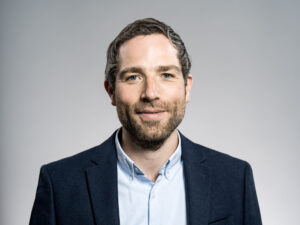Meet the scientist:
Florian Hahn (Fraunhofer IEG)

Welcome to our new series, “Meet the Scientist,” where we dive deep into the research and personal background of the scientists working on the PUSH-IT project. In our first edition, we had the privilege of interviewing Florian Hahn, the head of Post-Mining Exploration at Fraunhofer IEG. He is currently working on the demo site for Mine Thermal Energy Storage (MTES) in Bochum. The MTES will be installed at the Ruhr University’s technical centre and will be integrated in the university’s heating and cooling network.
In this interview, we will explore Florian’s background, the goals of his current research, and the promising potential of MTES for sustainable heat storage.
Could you introduce yourself briefly?
My name is Florian Hahn. I studied Petroleum Engineering at TU Clausthal for my Bachelor’s degree and then pursued a Master’s in Mineral Resources Engineering at RWTH Aachen. During my studies, I got to experience different places, including a semester in Universidad de Las Palmas de Gran Canaria and a European Geotechnical and Environmental Course at the University of Miskolc, TU Bergakademie Freiberg, University of Exeter, TU Delft and Wroclaw University of Technology.
After finishing my studies, I worked as a wellsite drilling engineer in the North Sea for a German Oil & Gas company. Since 2015, I’ve been part of the International Geothermal Centre and later at Fraunhofer IEG in Bochum. At Fraunhofer IEG I work as a scientific researcher focussing on the research and development of mine thermal energy storage and mine water utilization projects. Since 2020, I have been assigned with the development of the “Post-Mining-Exploitation” working group within the Fraunhofer IEG.
Could you explain the focus and primary objectives of your current research?
The transformation of Germany’s energy supply systems by 2050 presents a large technological and economic challenge. The German government is focusing on increasing the use of renewable energy sources and improved energy efficiency. In order to successfully transition to a sustainable energy supply, the development of thermal storage capacities is required since over 55% of the final energy consumption in Germany is currently used for heating and cooling.
However, the effective utilization of renewable thermal energy sources depends on adaptable management of heat supply networks and a diverse range of storage technologies. Mine thermal energy storage (MTES) systems could provide such a scalable and smart solution to counterbalance the seasonal fluctuations in the heating and cooling demand.
How does this research contribute to Ruhr University’s local heating and cooling network?
The planned MTES system at Ruhr University’s technical center could increase the use of renewable energy sources, for example using surplus heat from a data center. It would also assist in reducing the highest levels of demand in the district heating system. As a result, this can lead to lower operational costs and a decrease in CO2 emissions.
What are the key factors that make MTES promising for sustainable heat storage?
Especially in densely populated former mining regions, MTS has a large potential. It offers significant underground storage capacity within existing mining structures, without requiring extensive surface space. Moreover, the reutilization of abandoned mining infrastructures comes with the lowest (surface and medium deep) geothermal exploration risk. This largely due to the fact that a lot of the mining infrastructures have been well documented and researched, so that lasting benefits can be generated from these previously industrial areas.
Could you provide an update on the project’s current status?
Currently, we are in the process of setting up all the legal requirements for our upcoming drilling operation, scheduled for Q3 in 2024.
Looking forward, what do you envision in terms of innovation and sustainability impact, both locally and nationally, as a result of this project?
In the light of the current energy crisis, this pioneering project could serve as a guiding example for former coal regions, showing the way to transition from coal mining to innovative heat mining and storage solutions. Therefore, the development of various storage capacities will have a great impact on the future evolution of renewable energies, due to the fact that the seasonal mismatch between (surplus) heat supply in the summer and demand in the winter could be solved by underground storage systems
Florian Hahn explains his research at the General Assembly in Delft in 2023.

PUSH-IT is a project funded by the European Union’s Horizon Europe research and innovation programme under grant agreement No 101096566.
Funded by the European Union. Views and opinions expressed are however those of the author(s) only and do not necessarily reflect those of the European Union. Neither the European Union nor the granting authority can be held responsible for them.
